A list of the top period dramas available on DVD and to stream that take place during the Tudor era (1485 – 1603) and the Stuart era (1603 to 1714). Includes the Elizabethan, Jacobean, Caroline, (Interregnum) and Restoration periods. Costume period dramas filmed in England, UK and other countries set in that time period. Television mini-series, PBS, BBC, Masterpiece Theatre productions, historical dramas, heritage films.
Covers the reigns of Queen Elizabeth I (The Virgin Queen), King Henry VII who succeeded in ending the Wars of the Roses between the houses of Lancaster and York to found the highly successful Tudor house, King Henry VIII, King Edward VI, Queen Mary I. The Stuarts were the first kings of the United Kingdom. King James I of England who began the period was also King James VI of Scotland, thus combining the two thrones for the first time. Also includes the era of King Charles I, King Charles II, King James II, Queen Mary II, King William III, Queen Anne. More to come!
For the lists of the best period dramas and recommended documentaries in additional eras, wander over to: What To Watch: The Period Films List
Please note that all of the lists have multiple pages.
Click on the TITLE to stream the movie or buy the DVD.
Use the SEARCH box at the top of the list to find what you are looking for by keyword.
Use the FILTER option so you can narrow the results in any given list by these tags.


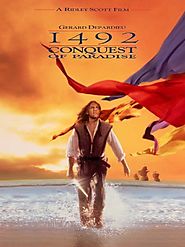
Determined to find a new sailing route to India, Christopher Columbus (Gérard Depardieu) convinces Spanish Queen Isabella (Sigourney Weaver) to finance an expedition. Setting sail with three ships, Columbus quells potential mutinies until the men arrive in North America. After his triumphant return home, Columbus is appointed governor of the new territory, but his dream of a peaceful new world does not fit with nobleman Don Adrian de Moxica's (Michael Wincott) visions of conquest.
Ridley Scott's "1492: Conquest of Paradise" sees Christopher Columbus as more complex and humane than in the other screen treatments of the character. His Columbus is an enlightened revision of the traditional figure, treating Indians the same as Spanish noblemen and seeming content with the notion that nature, not the Catholic God, is their deity. - Roger Ebert
Starring: Gérard Depardieu, Sigourney Weaver, Michael Wincott, Armand Assante.
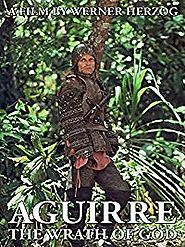
In the mid-16th century, after annihilating the Incan empire, Gonzalo Pizarro leads his army of conquistadors over the Andes into the heart of the most savage environment on earth in search of the fabled City of Gold, El Dorado. As the soldiers battle starvation, Indians, the forces of nature, and each other, Don Lope de Aguirre, "The Wrath of God, ", is consumed with visions of conquering all of South America and revolts, leading his own army down a treacherous river on a doomed quest into oblivion. Featuring a seething, controlled performance from Klaus Kinski, this masterpiece from director Werner Herzog is an unforgettable portrait of madness and power.
Set in 1560 in the Stuart era.
Werner Herzog’s “Aguirre, the Wrath of God” is one of the great haunting visions of the cinema. - Roger Ebert
Starring Klaus Kinski, Allejandro Repulles, Helena Rojo, Del Negro, Ruy Guerra, Peter Berling, Cecilia Rivera, Daniel Ades, Edward Roland, Alexandra Cheves.
In German and Spanish with English subtitles.
Not rated.
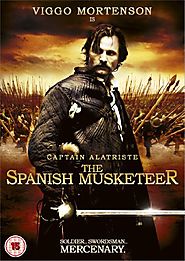
Capt. Alatriste (Viggo Mortensen), a heroic figure of Spain's 17th-century imperial wars (1620s - 1640s), becomes a mercenary. Based on the main character of a series of novels written by Arturo Pérez-Reverte. Five novels were published before the film was shot, and the film is based in the most important episodes in all of them...and beyond.
The story takes place during the 17th century in the Spanish Empire. Diego Alatriste is a soldier in the service of King Philip IV of Spain, during the Eighty Years War. The story begins in the Netherlands, where the tercio of Diego Alatriste fights against the Dutch during the Dutch Revolt. Lope Balboa (father of Íñigo and friend of the captain) is killed here. Diego decides to return to Madrid where he receives the young Íñigo Balboa in his care.
In Spanish with English subtitles.
Starring Viggo Mortensen, Elena Anaya, Unax Ugalde, Eduard Fernández.
Note: At a cost of 24 million Euros, this was the most expensive Spanish film ever made to date.
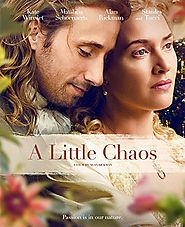
Academy Award-winner Kate Winslet stars in this romantic drama as Sabine, a strong-willed and talented landscape designer, who is chosen to build one of the main gardens at the new palace at Versailles in the court of King Louis XIV (Alan Rickman). In her new position of power, she challenges gender and class barriers while also becoming professionally and romantically entangled with the court's renowned landscape artist André Le Notre (Matthias Schoenaerts).
This handsomely mounted costume drama never pretends to be a realistic historical drama. Sabine, a widowed gardener who lost her young daughter in an accident, is a blunt, strong-willed modern woman who seems radically out of place and out of time. Rather than trying to justify her modernity, the movie — written by Alison Deegan with Mr. Rickman and Jeremy Brock — accentuates the disparity between Sabine and her surroundings. She simply could not have existed in the 17th century. Ms. Winslet brings to the role her characteristically intrepid doggedness. Nothing is going to stop Sabine from being herself and doing her job. - NYT
Set in 1682.
Starring Kate Winslet, Matthias Schoenaerts, Alan Rickman, Stanley Tucci, Helen McCrory.
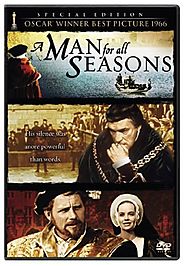
When the highly respected British statesman Sir Thomas More (Paul Scofield) refuses to pressure the Pope into annulling the marriage of King Henry VIII (Robert Shaw) and his Spanish-born wife, More's clashes with the monarch increase in intensity. A devout Catholic, More stands by his religious principles and moves to leave the royal court. Unfortunately, the King and his loyalists aren't appeased by this, and press forward with grave charges of treason, further testing More's resolve.
FRED ZINNEMANN has done a fine job of putting upon the screen the solid substance of "A Man for All Seasons," Robert Bolt's play about Sir Thomas More, and in doing so he presents us with an awesome view of a sturdy conscience and a steadfast heart. Within such magnificent settings as only England itself could provide to convey the resplendence and color of the play's 16th-century mise en scène, and with Paul Scofield playing Sir Thomas as he did so superbly on the stage, Mr. Zinnemann has crystallized the essence of this drama in such pictorial terms as to render even its abstractions vibrant. - NYT
Robert Bolt's successful play was not considered a hot commercial property by Columbia Pictures--a period piece about a moral issue without a star, without even a love story. Perhaps that's why Columbia left director Fred Zinnemann alone to make A Man for All Seasons, as long as he stuck to a relatively small budget. The results took everyone by surprise, as the talky morality play became a box-office hit and collected the top Oscars for 1966. At the play's heart is the standoff between King Henry VIII (Robert Shaw, in young lion form) and Sir Thomas More (Paul Scofield, in an Oscar-winning performance). Henry wants More's official approval of divorce, but More's strict ethical and religious code will not let him waffle. More's rectitude is a source of exasperation to Cardinal Wolsey (Orson Welles in a cameo), who chides, "If you could just see facts flat on without that horrible moral squint." Zinnemann's approach is all simplicity, and indeed the somewhat prosaic staging doesn't create a great deal of cinematic excitement. But the language is worth savoring, and the ethical politics are debated with all the calm and majesty of an absorbing chess game. --Robert Horton
Starring Paul Scofield, Wendy Hiller, Robert Shaw, Leo McKern, Nigel Davenport, John Hurt, Corin Redgrave.
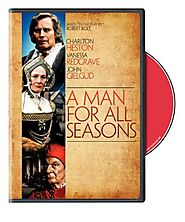
When the power-hungry Henry VIII (Martin Chamberlain) seeks to annul his marriage and take a new bride, principled Sir Thomas More (Charlton Heston), the Lord Chancellor of England, will not support the king on the matter. Though More's wife, Lady Alice (Vanessa Redgrave), understands his rift with Henry, his associate, Cardinal Wolsey (John Gielgud), is willing to go along with the king's wishes, creating a conflict between More and the two powerful leaders. It is based on the play of the same name by Robert Bolt, which was previously adapted in the Academy Award-winning 1966 film.
Charlton Heston makes his film directorial debut herein, and also plays the central role of Sir Thomas More, 16th century lord chancellor of England. Heston's version restores much of the text that had been removed from the earlier film--as well as the ubiquitous expository character "The Common Man", here played by Roy Kinnear. More's harsh but loving wife Alice is played in the remake by Vanessa Redgrave, who'd appeared unbilled as Anne Boleyn in the 1966 version (Arch-conservative Heston and ultra-liberal Redgrave in the same film? Fear not: each respected the other's acting skills, and they got along famously). - Hal Erickson, Rovi
Starring Charlton Heston, Vanessa Redgrave, John Gielgud.
Note: The 1988 film follows the original stage play more literally, runs a half-hour longer than the 1966 film, and could be considered more "stagy" than that earlier film, which not only divided the Common Man into several more realistic characters, but omitted small portions of the play itself.
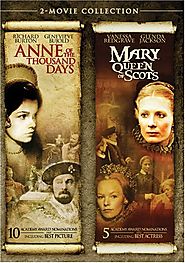
This film adaption of a Broadway play is based on the historical events surrounding the founding of the Church of England. Catherine of Aragon (Irene Papas), empowered wife of King Henry VIII (Richard Burton), has yet to give birth to an heir. King Henry's wandering eyes fall on the devout and nubile Anne Boleyn (Geneviève Bujold), who refuses his sexual advances. Henry eventually convinces Anne to marry him, but to move forward, the king must face a church that believes divorce is a sin.
Anne of the Thousand Days is the belated film adaptation of Maxwell Anderson's 1948 stage play. The story concentrates on the romance between Britain's King Henry VIII (Richard Burton) and his ill-fated second wife Anne Boleyn (Genevieve Bujold). After holding out for marriage rather than an illegitimate union, Anne marries Henry after he sheds himself of Katherine of Aragon -- causing a rift between the Crown and the Church in the process. Anne's inability to produce a male heir leads Henry to look about for other suitable mates. Henry's sinister right-hand man Cromwell (John Colicos) arranges for Anne to be condemned on a charge of adultery. She is beheaded, while Henry disconsolately sits in Windsor Castle, regretting this callous example of political expediency. Richard Burton is ideally cast in Anne of the Thousand Days, but it is Genevieve Bujold who delivers the best, most complex performance in the film. ~ Hal Erickson, Rovi
Starring Richard Burton, Geneviève Bujold, Irene Papas.
Note: There s also a silent film, Anna Boleyn (1920) starring Henny Porten, Emil Jannings: The story of the ill-fated second wife of the English king Henry VIII, whose marriage to the Henry led to momentous political and religious turmoil in England. "The tragic story of the second wife of England's Henry VIII is given a first-class treatment by Lubitsch, complete with opulent sets and some beautifully-shot exterior sequences. Henny Porten (Kohlhiesel's Daughter, Backstairs) gives a memorable performance as Boleyn, but the film really belongs to Emil Jannings (The Last Laugh, The Blue Angel), one of Germany's greatest screen stars, playing Henry. Jannings's bravura performance conveys Henry's decadence through his insatiable appetite for both food and women, but never reduces him to caricature or pure villain. Jannings also establishes the screen model for Henry that would be further developed by Charles Laughton almost fifteen years later in The Private Life of Henry VIII." - Amazon
Anonymous (2011)
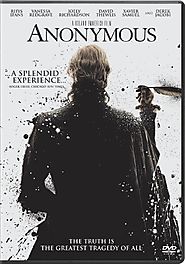
Set in the political snake-pit of Elizabethan England, Anonymous speculates on an issue that has for centuries intrigued academics and brilliant minds... who was the author of the plays credited to William Shakespeare? Anonymous poses one possible answer, focusing on a time when cloak-and-dagger political intrigue, illicit romances in the Royal Court, and the schemes of greedy nobles hungry for the power were exposed in the most unlikely of places: the London stage.
The film plunges us into the rich intrigue of the first Elizabethan age, including the activities of the Earl of Essex (Sam Reid), whose plot to overthrow the queen led to the inconvenience of beheading. Incredibly, for a film shot mostly on German soundstages, "Anonymous" richly evokes the London of its time, when the splendor of the court lived in a metropolis of appalling poverty and the streets were ankle-deep in mud. It creates a realistic, convincing Globe Theater, which establishes how intimate it really was. All of that makes "Anonymous" a splendid experience: the dialogue, the acting, the depiction of London, the lust, jealousy and intrigue. - Roger Ebert
Historical romp Anonymous takes an academic controversy (did the man named Shakespeare write the plays attributed to him?) and whips it into a lurid melodrama, crammed with political intrigue, heaving bosoms, flashing swordplay, conspiracies, forced marriage, incest, and more. Towards the end of the reign of Queen Elizabeth I, Edward de Vere, Earl of Oxford (Rhys Ifans, Enduring Love), seeks an outlet for his poetic drive: he tries to get the playwright Ben Jonson (Sebastian Armesto) to present his plays as Jonson's own. Jonson is reluctant to undercut his own work… but his friend, a vainglorious illiterate actor by the name of William Shakespeare (Rafe Spall), happily claims the glory when Oxford's plays prove hugely popular. But the real story of Anonymous isn't about authorship, it's about machinations to capture the throne of England when Elizabeth (Vanessa Redgrave) dies. Wily counselors vie with dashing secret heirs, royal dallying leads to shocking secrets, and supposedly the plays are inextricably caught up in it all--except that they're not, really, and so Anonymous, for all its clever plotting and lush production values, falls flat by the end. Still, it's an enjoyable confection up to then, and showcases some lovely (if woefully historically inaccurate--the mosh-pit moment is delightfully preposterous) presentations of bits of the plays. Also featuring David Thewlis (Naked) and Joely Richardson, daughter of Ms. Redgrave, playing the younger Elizabeth. --Bret Fetzer
Starring Sebastian Armesto, Derek Jacobi, Jamie Bower, Joely Richardson, Edward Hogg.
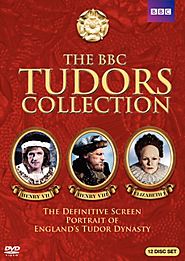
The BBC Tudors Collection combines the three most highly-praised, historically authentic mini-series ever produced about the great Tudor monarchs in one collectible set. From the heyday of BBC drama, these three tour-de-force dramas are meticulously researched and brilliantly acted, together winning 6 Emmy® awards and 8 BAFTAs (Britain’s equivalent of the Emmys). In The Shadow of the Tower, James Maxwell (The Portrait of a Lady) plays Henry VII, the first of the Tudor monarchs, who took over the throne after Richard III was killed at the Battle of Bosworth Field in 1485. Keith Michell (Murder She Wrote) received an Emmy and a BAFTA for his masterful portrayal of England’s infamously fickle king in The Six Wives of Henry VIII. And double-Oscar winner Glenda Jackson (A Touch of Class, Women in Love) turns in one of the most remarkable performances in television history, transforming herself into England’s Virgin Queen in Elizabeth R, winning two Emmys and a BAFTA. All 25 episodes of these three breathtaking dramas are included in this 12-disc collection, the definitive screen portrait of England’s Tudor dynasty.
SHADOW OF THE TOWER: Having aired on BBC2 in 1972, The Shadow of the Tower appears so authentic historically that it feels much, much older. Focusing on the rise of King Henry VII and the Tudor Dynasty, this 13-episode miniseries sheds light on not only what it took for a man to have usurped the throne in the 15th century, but also his difficulties in keeping it. Any viewer who has interest in the politics of royalty, as well as viewers who admire the cultural aesthetic of the Middle Ages, will find this program both pleasing to the eyes and highly dramatic. The episodes, having had several different writers, vary in dramatic tone and subject matter, ranging from focus on royal celebrations and fanfare, to religious and cultural matters of the time, to the ways Henry Tudor maintained rule while staving off various threats to the crown.
THE SIX WIVES OF HENRY VIII: A British television series originally broadcast on CBS (and rebroadcast on PBS) in America in 1971, The Six Wives of Henry VIII remains a painless way to learn something about royal history and its impact on the political and religious landscape of England. Keith Michell stars as King Henry VIII, who assumes the throne as a boy after the death of his older brother and inherits the latter's Spanish betrothed, Catherine of Aragon (Annette Crosbie), as well. Growing up and increasingly complicated in personality, with an ever-growing appetite for elusive happiness as well as power and food, Henry maneuvers (and is maneuvered by) forces around him to break from Rome and create the Church of England, in part to accommodate his wish for a divorce.
ELIZABETH R: Glenda Jackson is majestic in the six-video miniseries from the BBC, Elizabeth R. Covering the entire reign of Elizabeth I, from her struggles with her half-sister Mary just before being crowned as queen to her death in 1603, the series profiles the life of the Virgin Queen in detail--and with historical accuracy--not possible in the as beautiful, but much shorter, theatrical release, Elizabeth. Religious conflicts, her struggle over the execution of her cousin Mary, Queen of Scots, battles with Spain, court politics, and of course her flirtations with Robert Dudley (portrayed as an almost-comical fop by Robert Hardy) and her decision to remain unmarried are just some of the highlights of this magnificently costumed and finely acted piece. Jackson skillfully captures the capricious moods and incredible intellect of the queen who defied the pope and the conventions of the time as a strong-willed woman, and characters from textbooks--Sir Francis Bacon, Sir Walter Raleigh, King Phillip II--come vividly to life. Elizabeth R (and for those not in the know, the "R" is for "Regina") is a splendid melding of history and entertainment, and as thorough as this series is, you will still long for more. --Jenny Brown
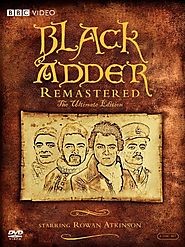
Rowan Atkinson is deliciously twisted as the comic villain, Edmund Blackadder, in the enormously popular comedy series. Follow Blackadder in hysterical send-ups of the Middle Ages, the Elizabethan age, the Regency period, and World War I.
One of the best comedy series ever to emerge from England, Black Adder traces the deeply cynical and self-serving lineage of various Edmund Blackadders from the muck of the Middle Ages to the frontline of World War I. In his pre-Bean triumph, British comic actor Rowan Atkinson played all five versions of Edmund, beginning with the villainous and cowardly Duke of Edinburgh, whose scheming mind and awful haircut seem to stand him in good stead to become the next Archbishop of Canterbury--a deadly occupation if ever there was one. Among tales of royal dethronings, Black Death, witch smellers (who root out spell makers with their noses), and ghosts, Edmund is a perennial survivor who never quite gets ahead in multiple episodes. Jump to the Elizabethan era and Atkinson picks up the saga as Lord Edmund, who is perpetually courting favor from mad Queen Bess (Miranda Richardson) and is always walking a tightrope from which he can either gain the world or lose his head. Subjected to bizarre services for her majesty (at one point, Edmund is asked to do for potatoes what Sir Walter Raleigh did for tobacco), Edmund--as with his ancestor--can never quite fulfill his larger ambitions. The next incarnation we encounter is in late-18th-century Regency England. This time, Blackadder is a mere butler to the idiotic Prince Regent (Hugh Laurie in a brilliantly buffoonish performance) and is caught in various misadventures with Samuel Johnson, Shakespearean actors, the Scarlet Pimpernel, and William Pitt the younger. With a brief stop in Victorian London for a Christmas special, the series concludes with several episodes set during the Great War. The new Edmund is a career Army officer, but a scoundrel all the same. Shirking his duties whenever possible and taking advantage of any opportunity for undeserved reward, this final, deeply sour, and very funny Blackadder negotiates survival among a cadre of fools and dimwits. No small mention can be made of Atkinson's supporting cast, easily among the finest comic performers of their generation: besides Laurie and Richardson, Stephen Fry, Tony Robinson, and Tim McInnerny. --Tom Keogh
Starring Rowan Atkinson, Brian Blessed, Elspet Gray, Tim McInnerny, Patrick Allen.
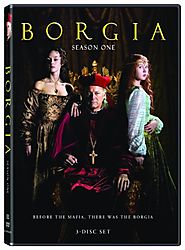
It was the age of Da Vinci and Michelangelo, of enlightened creativity and unparalleled intellectual achievement. But it was also the age of Machievelli, of rampant lawlessness, incessant war and unspeakable depravity. At the heart of the world order was the Vatican, the arbiter of conflicts between kingdoms and empires. And at the center of the Vatican was a man whose quest for power would propel him to seek the ultimate prize, the holy see of Rome. He was a man whose name would become synonymous with ruthlessness, and whose reign as pope would be remembered as the most infamous chapter of the history of the Catholic church -Rodrigo Borgia. His four children -Juan, the oldest, a prideful, lazy, unscrupulous sexual predator, Cesare, a young man torn between a faith that was not his calling and his dark violent nature, Lucretia, a young girl discovering the secret power that a women's sexuality holds, and Goffredo, an innocent child who would come of age in a family riven by conflict.
A French-German-Czech production (in English) historical drama television series created by Tom Fontana, the show recounts the Borgia family's rise to power and subsequent domination of the Papal States during the Renaissance.
Starring Mark Ryder, Isolda Dychauk, Diarmuid Noyes.
Note: Not suitable for children or the sensitive. This series is said to differ from Showtime's The Borgias in several ways: it had a smaller budget with less than ideal costumes, slower pacing allowing for greater historical detail, including more "period-appropriate" sex and violence, which may be quite difficult to watch. This one is not for Willow and Thatch, but is listed here as many who liked The Borgias also felt that Borgia: Faith and Fear was worth watching.
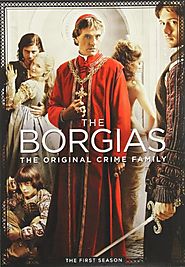
The Borgias is a one-hour drama series based on the infamous Italian Renaissance family The Borgias. Jeremy Irons stars as Rodrigo Borgia, the cunning, manipulative patriarch of The Borgia family who ascends to the highest circles of power within Renaissance-era Italy. The series begins as the family's patriarch Rodrigo becomes Pope, propelling him, his two Machiavellian sons Cesare and Juan, and his scandalously beautiful daughter, Lucrezia, to become the most powerful and influential family of the Italian Renaissance. And all the power and influence eventually leads to their demise. The series ran for three seasons. Excellent costumes by Gabriella Pescucci.
The Borgias, led by patriarch Rodrigo, are a family of outsiders from Spain who try to take over control of Renaissance-era Italy. Through the use of bribery, extortion and torture, Rodrigo rises up the ranks to become pope. Two of Rodrigo's children are used as pawns by being married off to members of rival families at a young age. Vanozza, Rodrigo's long-time mistress and mother of his children, and Giulia Farnese battle for the elder Borgia's affections. The story of the Borgias has inspired such works as Machiavelli's political treatise "The Prince" and Mario Puzo's "The Godfather."
Starring Jeremy Irons, François Arnaud, Holliday Grainger.
Note: Not suitable for children. There was also a The Borgias (1981) BBC version starring Adolfo Celi, Oliver Cotton, Anne Louise Lambert and Barbara Shelley, but it does not appear to be available on DVD at this time. The 10 episodes follow events from 1492 when Rodrigo is elected pope and concludes in 1507 with Cesare's violent death. there is also Borgia: Faith and Fear (2011) a French-German-Czech-Italian historical drama television series created by Tom Fontana and starring John Doman, Isolda Dychauk, Art Malik, Diarmuid Noyes, Mark Ryder.
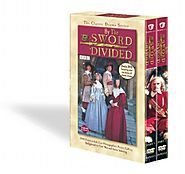
The series was a historical drama set during the mid 17th century in the Stuart Era, dealing with the impact of the English Civil War on the fictional Lacey family, made up of both Royalist and Parliamentarian supporters. It follows the family as it is torn apart by the conflicting and changing loyalties of the war, as families were during that time, and the defeat of the Royalist forces at the end of the First English Civil War. Series two covers the second and third civil wars and the eventual Restoration of the Monarchy. The last episodes sees the surviving members of the family (from both sides of the divide) witness the arrival of Charles II on a visit to the ancestral Lacey home.
BY THE SWORD DIVIDED is one of the finest BBC series ever produced--historically quite detailed, yet filled with the passions, fears, and hatreds that certainly possessed the English people during the period 1645-1660. For those addicted to intelligently produced series, for those interested in English history, and for those willing to experience something quite different from the run-of-the-mill "historical" drama these days, try this series. It's in TWO parts, the first leading up to the defeat of King Charles I, and the second part until the Restoration. - Amazon reviewer
Starring Sharon Maughan, Andrew MacLachlan, Lucy Aston, Tim Bentinck, Rob Edwards.
Shown on PBS Masterpiece Theatre.
Note: Arnescote Castle depicted in the series is filmed at Rockingham Castle which at the time of the English Civil War was a Royalist family's home. So that lends something to the authenticity of the setting. This listing is for a Region 2. DVD.
Cromwell (1970)
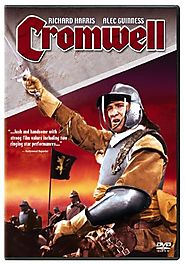
In 1640s England, King Charles I (Alec Guinness) is engaged in a power struggle with Parliament, and civil war seems imminent to House of Commons member Oliver Cromwell (Richard Harris), who's preparing to depart for the American colonies. When he's asked to stay to fight for the Parliamentary cause, however, Cromwell agrees and proves himself a brilliant leader of the Roundhead army. Soon, it's up to him to lead his army to victory over the king's Cavaliers and take back England for the people.
Richard Harris and Sir Alec Guinness star in this sweeping, handsomely-mounted epic drama recounting the battle which raged between the monarchy and a commoner over the very soul of Great Britain. In 17th-century England, ambitious country gentleman Oliver Cromwell (Harris) dared to challenge the political oppression and corruption which besieged his nation. Watching his power being usurped by a commoner, King Charles I (Two-time Oscar-winner Guinness, 1957 Best Actor, The Bridge on the River Kwai; 1980 Honorary Award) springs to challenge his adversary. One man will become absolute ruler; the other will be executed. Rousing battle sequences, excellent lead and supporting performances fromRobert Morley, Dorothy Tutin and Timothy Dalton, Academy Award-winning costume design and spectacular photography by renowned cinematographer Geoffrey Unsworth (Cabaret, Tess), make CROMWELL an outstanding historical drama in the tradition of Braveheart.
Takes place from approximately 1640 to 1660 in the Stuart era.
Starring Charles Gray, Richard Harris, Michael Jayston, Alec Guinness, Dorothy Tutin.
Note: The critics didn't celebrate the film for its originality, but gave it kudos for being an accurate account, with NYT calling it "a rather nice, serious, eighth grade introduction to a place and time." And Roger Ebert said "As nearly as possible in a movie that lasts three hours and covers maybe 10 years, "Cromwell" is faithful to the facts. We follow King Charles' differences with Parliament, Cromwell's differences with Charles and Parliament, everyone's feelings about the divine right of kings, and Cromwell's final seizure of power."
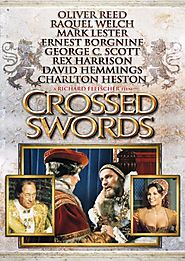
Released in the UK as The Prince and the Pauper , this star-studded twist on Mark Twain's classic social satire is a great flick for the whole family. When a commoner bumps into the Prince (and future King) of Wales and they decide to make a switch of clothes as a practical joke, they are unexpectedly separated and forced to take on the other's life. Set in In 16th Century London, England and based on "The Prince and the Pauper," Mark Twain's novel about adventure and intrigue in the court of Henry VIII.
Starring Raquel Welch, Oliver Reed, Harry Andrews, Ernest Borgnine, Sydney Bromley, Peter Cellier, Felicity Dean.
Note: There is also a The Prince and the Pauper (1937) starring Errol Flynn, Claude Rains, Henry Stephenson, a Disney live-action version of The Prince and the Pauper (1962) starring Guy Williams, Laurence Naismith, The Prince and the Pauper (BBC TV mini-series 1996) six-part miniseries version starring Peter Jeffrey, James Purefoy, Sophia Myles, Keith Michell, Philip Sarson, and a The Prince and the Pauper (2000) family television movie starring Aidan Quinn, Alan Bates, Jonathan Hyde.
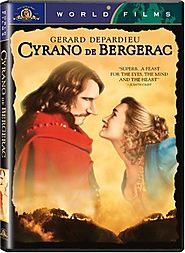
In 1640 France, soldier and poet Cyrano de Bergerac (Gérard Depardieu) is in love with Roxane (Anne Brochet), but he's too ashamed to admit it because of his big nose. When a cadet, Christian (Vincent Perez), falls for Roxane, he asks for Cyrano's help in sharing his feelings. Cyrano writes love letters signed with Christian's name, and Roxane doesn't realize that it's Cyrano's words she falls for. She marries Christian, and Cyrano continues to keep the other man's secret, even after tragedy strikes.
It is expansive, funny, gross, dainty, and always humane. It's a disciplined whirlwind of conflicting emotions that finds surprising new life in a theatrical antique. (It is) a physically elaborate period spectacle. Seventeenth-century France is re-created in grand sets, magnificent costumes and the kind of crowd scenes in which everybody roisters heartily on cue. Mr. Depardieu's must be the definitive Cyrano, the Cyrano that will make all other actors hesitate before they take on the role. - New York Times
"Cyrano de Bergerac" is a splendid movie not just because it tells its romantic story, and makes it visually delightful, and centers it on Depardieu, but for a better reason: The movie acts as if it believes this story. Depardieu is not a satirist - not here, anyway. He plays Cyrano on the level, for keeps. - Roger Ebert
In French with English subtitles.
Starring Gérard Depardieu, Anne Brochet, Vincent Perez, Jacques Weber, Roland Bertin.
Note: The full movie Cyrano De Bergerac (1950) is available to stream for free on the Willow and Thatch Period Drama Channel. Also, Steve Martin and Daryl Hannah starred in the well received modern-dress comedy Roxanne (1987), which was inspired by the 1897 play "Cyrano de Bergerac" by Edmond Rostand.
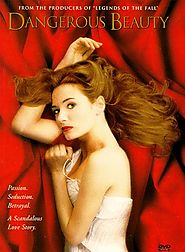
A Venetian courtesan becomes a hero to her city, but later becomes the target of an inquisition by the Church for witchcraft.
"The life you lead, the freedom you have--will you deny my daughters the same chance?" Not the request every mother would address to a prostitute, but "Dangerous Beauty" makes a persuasive case for the life of a courtesan in 16th century Venice. At a time when Europeans are bemused by our naivete about dalliance in high places, this is, I suppose, the film we should study. It's based on the true story of Veronica Franco, a well-born Venetian beauty who deliberately chose the life of a courtesan because it seemed a better choice than poverty, or an arranged marriage to a decayed nobleman. - Roger Ebert
Although it was unfortunately ignored during its brief theatrical release, this sumptuously seductive production is that rarest of cinematic breeds, the (barely) respectable guilty pleasure. Combining historical fact with hysterical anachronisms of language and mannerism, it's been tailored for maximum contemporary appeal but maintains a lush, romantic feel for its factual 16th-century tale of Venetian love, lust, and political repression. Catherine McCormack (Mel Gibson's ill-fated bride in Braveheart) delivers a star-making performance as the "dangerous beauty" who becomes a skillful courtesan to pursue her forbidden love for a dashing Venetian senator (Rufus Sewell). It's all rather silly in a high-toned fashion, and the film turns dour when the church intervenes with a Scarlet Letter-like papal inquest. But the movie's joyously ribald vitality is utterly irresistible, and the casting of McCormack with Jaqueline Bisset (as her mother and courtesan mentor) is a stroke of pure genius. Merchant-Ivory would've made a smarter film from this material, but it probably wouldn't be nearly as entertaining. --Jeff Shannon
Starring Catherine McCormack, Rufus Sewell, Oliver Platt, Fred Ward, Naomi Watts.
Note: ''Dangerous Beauty'' is rated R. It has sexual situations and several scenes of nudity.
Set in the 1600s and filmed during the Nazi occupation of Denmark, Carl Dreyer’s Day of Wrath (Vredens dag) is a harrowing account of individual helplessness in the face of growing social repression and paranoia. Anna, the young second wife of a well-respected but much older pastor, falls in love with her stepson when he returns to their small seventeenth-century village. Stepping outside the bounds of the village’s harsh moral code has disastrous results. Exquisitely photographed and passionately acted, Day of Wrath remains an intense, unforgettable experience. Part of The Criterion Collection.
"Day of Wrath" takes place in a beautiful, bucolic Denmark, with painterly, Rembrandt-worthy images of shadow and light capturing the joys of a new spring and the sensual pleasures of a romantic tryst. But fear and suspicion loom over everything. It’s the 1600s and suspected witches are being routed out and burned at the stake. The woman with a glint in her eye, or the one whose laugh has a new inflection – perhaps they’re in league with the Devil? - BFI
Astonishing in its artistically informed period re-creation as well as its hypnotic mise en scene, it challenges the viewer by suggesting at times that witchcraft isn't so much an illusion as an activity produced by intolerance. - ReelTalk Movie Reviews
However bleak, Day of Wrath is a masterpiece. See it. - New York Observer
Astonishing in its artistically informed period re-creation as well as its hypnotic mise en scene, it challenges the viewer by suggesting at times that witchcraft isn't so much an illusion as an activity produced by intolerance. - Chicago Reader
In black and white.
In Danish with English subtitles.
Starring Kirsten Andreasen, Sigurd Berg, Albert Høeberg, Harald Holst, Emanuel Jørgensen.
Note: This is available as part of the Carl Theodor Dreyer Box Set. which also includes Ordet, and Gertrud. Each is an intense exploration of the clash between individual desire and social expectations, with Dreyer’s famously perfectionist attention to detail shining throughout. You may also be interested in Witchfinder General (1968): "Among British cinema’s most unforgettable dramatisations of the hysteria and unrest of the English civil war period (and a key reference point for A Field in England), Michael Reeves’s film stars Vincent Price as the diabolical 17th-century witch-hunter Matthew Hopkins." - BFI Set during the time of Cromwell's reign (1653 - 1658). Not for the faint of heart.
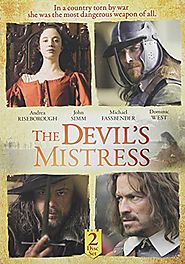
Set between the years 1642 and 1660, "The Devils Mistress" charts the progress of the English Civil War through the eyes of the a 17 year old girl, the fictional Angelica Fanshawe.
First of all, let it be known that the blurb on the back of the DVD case is quite misleading in its attempts to market the product as more racy and spicy than it really is. The protagonist is described as a "manipulative" woman who "exploits a country in crisis in a bid to better her own position" and "embraces her sexuality to the shock of her husband". The tagline is "in a country torn by war, she was the most dangerous weapon of all." From all this you might be mistaken into thinking that "The Devil's Whore" is a typical bodice-ripper / faux-historical melodrama, when it fact it is quite a tasteful period piece with a respectable, wholly sympathetic heroine who neither is nor does any of the things the blurb describes. Though there are a few instances in which historical license is taken, there is also a genuine sense of wanting to capture the key events of the English Civil War and integrate the fictional character of Angelica Fanshawe into the proceedings without compromising the authenticity of the piece. Originally a four-part miniseries, which has here been spread across two discs without any noticeable breaks, "The Devil's Whore" alternates between two narratives: the life-story of Angelica Fanshawe (said to have been based on Anne Fanshawe, a memoirist who lived 1625 - 1680) and the English Civil War, following such recognizable figures as King Charles I, Oliver Cromwell, Thomas Rainsborough, John Lilburne and Edward Sexby. A good balance is maintained between the weighty historical events and Angelica's more glamorous tribulations, and she is incorporated successfully enough into the proceedings that you may find it easy to believe the film's (utterly false) claim that this is the "true" story of her life and times.Roughly spanning the years from 1638 to 1660 (to be more specific, the historical storyline begins with Charles' embarrassing attempt to arrest members of Parliament in 1642, complete with his famous "it would seem my birds have flown" comment and ends with Cromwell's death in 1658, though Angelica's story begins and ends slightly before and after these events) the miniseries takes us through the Civil War: the chaotic courtroom trials of "freeborn" John Lilburne, the battles between the Cavaliers and Roundheads, the tension between various sects of Catholics and Protestants, the execution of King Charles, and the power vacuum that follows. - Amazon reviewer
Starring Andrea Riseborough, Dominic West, Tom Goodman-Hill.
Diane (1956)
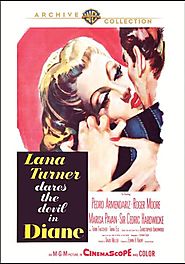
Diane de Poitiers (Lana Turner) becomes the mistress of Prince Henri (Roger Moore), second in line to the throne. Their liaison continues through Henri's arranged marriage to the Italian Catherine de' Medici (Marisa Pavan). Unknown to Catherine, her Medici relations arrange the death of the Dauphin and Henri's ascent to the throne as King Henry II. The antagonism of the two women, abetted by Medici scheming, eventually results in the death of Henri. Catherine, now ruling as regent for her three young sons, banishes Diane but spares her rival's life in a gesture of mutual respect. The action is set in 16th-century France.
She brought beauty and poise to the screen while she hobnobbed with mobsters in Johnny Eager, plotted murder in The Postman Always Rings Twice and helped expose the Hollywood dream factory in The Bad and the Beautiful. Renowned for steamy melodramas, Lana Turner rarely starred in lavish costume dramas. But Diane was an exception that showcased her beauty and poise amid the finery of Renaissance France. Turner plays Diane de Poitiers in this historical romance, her last film under contract to M-G-M. The story begins in the mid-1500s. A marriage between France’s Prince Henri (Roger Moore) and Italy’s Catherine de Medici (Marisa Pavan) has the potential to establish peace, so Diane is asked to tutor Henri in the ways of a courtier. Fencing and etiquette are part of the instruction; falling in love is not. Diane and Henri begin an affair that continues despite the royal union…and precipitates a Medici plot to wrest control of France.
Starring Lana Turner, Pedro Armendáriz, Roger Moore, Marisa Pavan, Cedric Hardwicke.
Note: Many think of this as a terrific sleeper, ill-represented by the cover art and tag-line, and released at a time when costume dramas were moving out of fashion "This story was originally acquired for Garbo in the 1930s but languished in the MGM story department until someone unearthed it for Turner. It was released at the end of the costume drama cycle and did meager business despite the expense lavished on it. But 1955 was the year when reality-based films had taken the lead; MARTY; THE ROSE TATTOO; EAST OF EDEN; MR. ROBERTS; and PICNIC were all released that year, and DIANE sank in their prop wash." - TV Guide
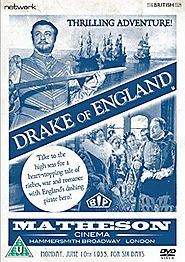
Imposing Canadian-born stage actor and playwright Matheson Lang was one of the twentieth century's greatest Shakespearean players, and became Britain's foremost screen actor during the 1920s; in Drake of England, one of his final films, he takes the title role in Arthur Woods' portrayal of the life and times of the flamboyant piratical adventurer who founded Britain's sea fortunes. From clandestine romance at the court of Elizabeth I (played by Athene Seyler) to conquests in the newly discovered lands of South America and spectacular victory over the Armada, Drake of England (aka Drake the Pirate) offers a panoramic overview of Drake's life. One of very few surviving films directed in the 1930s by the prodigiously talented Woods.
Sir Francis Drake (Lang), first English circumnavigator of the globe, is featured in this exciting adventure with his amazing defeat of the Spanish Armada in 1588 and a romance between the dashing sailor and a lady-in-waiting for Queen Elizabeth (Baxter). ~ Rovi
In black and white.
Starring Allan Jeayes, Matheson Lang, Athene Seyler, Jane Baxter, Henry Mollison.
Note: If you like really old films, you may also be interested in the silent historical drama Dorothy Vernon of Haddon Hall (1924) which is based upon the 1902 novel of the same name: "In the year 1550, Sir George Vernon agrees to have his young daughter Dorothy betrothed to John Manners, the son of the Earl of Rutland. Sir George signs a contract, promising that the marriage will take place on Dorothy's 18th birthday, or else he will have to pay a large penalty to Rutland. But when the two children have grown older, rumors of John's wild behavior in France provoke Sir George to call off the engagement, and to pledge his daughter instead to her cousin Malcolm. Rutland now claims the forfeit from Sir George, and meanwhile, John has befriended Mary Stuart, the sworn enemy of Elizabeth, who is now Queen of England." Starring Mary Pickford, Anders Randolf, Marc McDermott.
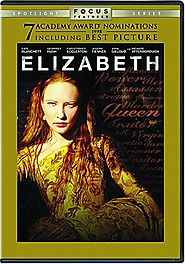
Academy Award-winners Cate Blanchett, Geoffrey Rush and Richard Attenborough lead a distinguished cast in Elizabeth - the critically acclaimed epic of the Queen's turbulent and treacherous rise to power! Before the Golden Age, Elizabeth was a passionate and naïve girl who came to reign over a land divided by bloody turmoil. Amidst palace intrigues and attempted assassinations, the young Queen is forced to become a cunning strategist while weighing the counsel of her mysterious advisors, thwarting her devious rivals, and denying her own desires for the good of her country. Relive the majesty and drama of one of history's greatest monarchs in this stunning production that was honored with 7 Academy Award nominations including Best Picture!
The England of the first Elizabeth is a dark and sensuous place; the court lives intimately with treachery, and cloaks itself in shadows and rude luxury. As seen through the fresh eyes of an Indian director, Shekhar Kapur, "Elizabeth" is not a light "Masterpiece Theater" production, but one steeped in rich, saturated colors and emotions. The texture of the film is enough to recommend it, even apart from the story. - Roger Ebert
The film begins in 1554.
Starring Cate Blanchett, Geoffrey Rush, Joseph Fiennes, Christopher Eccleston, John Gielgud.
Note: Elizabeth is rated R. It includes violence, nudity, sexual situations and quaint Tudor profanity.
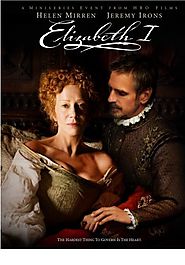
Helen Mirren and Jeremy Irons star in Elizabeth I, a two-part HBO Films miniseries event that explores the intersection of the private and public life of Elizabeth I (Mirren) in the latter half of her reign, offering a personal look at her allies, her enemies and her suitors as she struggles to survive in a male-dominated world.
Part 1 explores Elizabeth's tempestuous relationship with the Earl of Leicester (Irons) as it survives a French suitor, war, treason, and illness. Part 2 follows Elizabeth through her later years, during which she had an equally passionate affair with the young, ambitious Earl of Essex (Hugh Dancy), who had been raised, ironically, by his stepfather Leicester. In the end, Elizabeth I sheds light on one of the most popular members of the monarchy who held absolute power over everything...except her heart.
Helen Mirren's Elizabeth I could almost be cousin to her Jane Tennison. Like the dedicated detective chief inspector, Queen Bess is not without a heart, but work comes first and any romantic entanglements are doomed to fail. Fortunately, she has her friendships. Directed by Tom Hooper (Prime Suspect 6), this two-part HBO/Channel 4 tele-film begins in 1579. The Virgin Queen has been on the throne for 20 years, but has not married. Her closest relationship is with Robert Dudley, the Earl of Leicester (Jeremy Irons), whom the council will not allow her to wed. Because Robert wishes to produce an heir, he marries another, garnering Elizabeth's disfavor (and nor is he all that thrilled about her dalliance with Henry, the Duke of Anjou). In time, he'll return to her good graces. As she explains, "Friendship outlasts love and is stronger than love." Then, as his health begins to fails, she'll turn to his stepson, the dashing, if duplicitous Robert Devereaux, the Earl of Essex (Hugh Dancy, the Hooper-directed Daniel Deronda). Meanwhile, Mary, Queen of Scots (Barbara Flynn) plots against her Protestant cousin. Even after Mary makes her exit, plenty of other powerful Catholics will stop at nothing to seize the crown. Marked as much by triumph as tragedy, the role of Elizabeth I has been catnip for many illustrious actresses, notably Bette Davis, Glenda Jackson, and Cate Blanchett. Mirren's multi-faceted portrayal of the queen's golden years is a worthy addition to that canon and Irons is a particularly formidable foil. --Kathleen C. Fennessy
Starring Helen Mirren, Hugh Dancy, Toby Jones, Patrick Malahide, Ian McDiarmid.
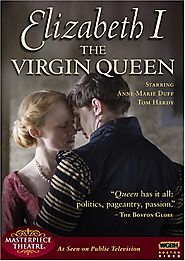
Vulnerable and imperious, passionate and unreachable, from teenage princess to accomplished queen, forever torn between duty and personal longing, the reign of Elizabeth I is exposed in lavish and spectacular style.
Anne-Marie Duff stars as the enigmatic 'Virgin Queen' in a spellbinding drama about the life of one of Britain's greatest monarchs, Elizabeth I. Her femininity baffled and threatened the male order of Renaissance England for more than 40 years. The role is as challenging and complex as anything history offers.
Paula Milne's powerful script about the long and eventful life of England's iconic Queen was filmed against a backdrop of some of Great Britain's most beautiful houses and landscapes. The Virgin Queen explores the full sweep of Elizabeth's life: from her days of fear as a potential victim of her sister's terror, through her great love affair with Robert Dudley, into her years of triumph over the Spanish Armada, and finally her old age and her last, enigmatic relationship with her young protégé, the Earl of Essex.
Starring Anne-Marie Duff (The Aristocrats, The Magdalene Sisters) as the shrewd and captivating queen who defended her throne amidst an atmosphere of plotting and intrigue, torture and murder, The Virgin Queen is a riveting drama that explores the fascinating 44-year reign of Elizabeth I.
Shown on PBS Masterpiece Theatre.
Starring Anne-Marie Duff, Joanne Whalley, Dexter Fletcher, Tara Fitzgerald, Sienna Guillory, Tom Hardy, Ian Hart, Robert Pugh, Kevin McKidd, Hans Matheson, Emilia Fox, Ben Daniels, Ewen Bremner and Bryan Dick.
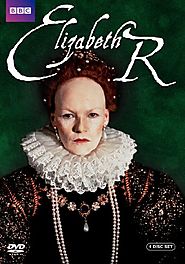
"Elizabeth R" follows the life of Britain's Queen Elizabeth I -- Henry VIII's daughter by Anne Boleyn -- through gradual transition from a young, beautiful princess to an unpopular old woman. Elizabeth R is a BBC television drama serial of six 85-minute plays.
Glenda Jackson's performance in the title role won her two Emmy Awards - for Best Actress in a Drama Series and Best Actress in a Movie/TV Special (for the episode "Shadow in the Sun"). The series itself won the Emmy for the Best Dramatic Series in 1972 (the first British TV series ever to win the American TV award, before Upstairs, Downstairs carried the award two years later). Costume designer Elizabeth Waller recreated many of the historical Elizabeth's actual gowns for Glenda Jackson, adapting them from a number of the Queen's famous, official portraits.
Shown on PBS Masterpiece Theatre.
Starring Glenda Jackson, Ronald Hines, Robert Hardy.
Note: In 1971 Glenda Jackson endured physical agonies with costumes that were so heavily padded she had trouble breathing and was unable to bend her arms. Some were also so heavy that she had to remain seated, others so big she had trouble walking through doors. And that was after she had already spent six hours in make up and prosthetics ageing herself up for the later programmes. - BBC The production filmed at a variety of locations including Penshurst Place which doubled as the Queen's castle grounds and Chiddingstone in Kent.
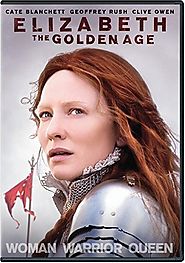
Academy Award winners Cate Blanchett and Geoffrey Rush join Academy Award nominee Clive Owen in a gripping historical thriller full of suspense, intrigue and adventure!When Queen Elizabeth's reign is threatened by ruthless familial betrayal and Spain's invading army, she and her shrewd advisor must act to safeguard to the lives of her people. But when a dashing seafarer, Walter Raleigh, captures her heart, she is forced to make her most tragic sacrifice for the good of her country. Elizabeth: The Golden Age tells the thrilling tale of one woman's crusade to control her love, destroy her enemies and secure her position as a beloved icon of the western world.
Written by William Nicholson and Michael Hirst, “The Golden Age” has sweep and momentum and almost as many mood shifts and genre notes as the queen has dresses. It’s intentionally playful and an inadvertent giggle, an overripe melodrama that’s by turns a bodice-ripper, a cloak-and-dagger thriller and a serious-minded historical drama with dubious contemporary overtones. - NYT
In 1998's Elizabeth, Shekhar Kapur added a layer of suds to his history lesson; the director follows the same audience-pleasing recipe in Elizabeth: The Golden Age. Since the first film, Blanchett scored an Oscar for her note-perfect rendition of Katharine Hepburn in The Aviator, and she plays the preternaturally bemused monarch in a similar fashion. By 1585, Elizabeth I is an experienced ruler about to face two of her biggest challenges: betrayal by her Catholic cousin, Mary Stuart (Control's Samantha Morton), and invasion by the Spanish Armada. It isn't so much that the Protestant Elizabeth wishes to rid England of "papists," but that she wants her country to remain free from foreign domination. Closer to her home, she enjoys a sisterly relationship with lady-in-waiting Bess (rising Aussie star Abbie Cornish). That changes when Sir Walter Raleigh (a dashing Clive Owen) hits the scene. In order to continue exploring the New World, he seeks the queen’s sponsorship. She is charmed, but Raleigh only has eyes for Bess. As in the previous picture, Elizabeth enjoys better luck at affairs of state than affairs of the heart, but the conclusion is more beatific than before (and Kapur intends a third installment if Blanchett is willing). Elizabeth: The Golden Age is a rush of royal intrigue, bloody torture, fantastic headpieces, and irresistibly ripe dialogue, like "I have a hurricane in me that will strip Spain bare if you dare to try me!" To Kapur, victory for the Virgin Queen was a viable alternative to sex. --Kathleen C. Fennessy
Starring Cate Blanchett, Geoffry Rush, Clive Owen, Samantha Morton.
Note: “Elizabeth: The Golden Age” is rated PG-13. A bodice rips, one head falls.
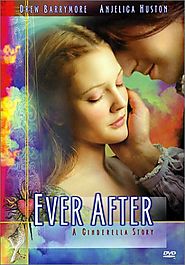
This updated adaptation of the classic fairytale tells the story of Danielle (Drew Barrymore), a vibrant young woman who is forced into servitude after the death of her father. Danielle's stepmother Rodmilla (Anjelica Huston) is a heartless woman who forces Danielle to do the cooking and cleaning, while she tries to marry off her own two daughters. But Danielle's life takes a wonderful turn when she meets the charming Prince Henry (Dougray Scott).
This Cinderella is far from a victim. Much to her stepmother's demise, Danielle's independence and intelligence attract the love of the prince.
I went to the screening expecting some sort of soppy children's picture and found myself in a costume romance with some of the same energy and zest as "The Mask of Zorro." And I was reminded again that Drew Barrymore can hold the screen and involve us in her characters. I liked that movie for its human comedy and romantic energy, and the same qualities are abundant in "Ever After"--along with lush scenery, astounding locations and luxuriant costumes. - Roger Ebert
Starring Drew Barrymore, Anjelica Huston, Dougray Scott, Patrick Godfrey, Megan Dodds.
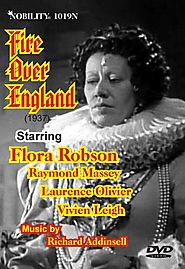
The situation for England is perilous. Still reeling from its own Protestant-Catholic strife, England is a second-rate power under constant threat from Spain's mighty Armada. (In 1588, the Spanish Armada sailed against Elizabeth I's England.) With unflinching resolve and magisterial bravery, Queen Elizabeth survives assassins and traitors to instill in her people the pride and courage necessary to defeat Spain and define the greatness of England. The setting and the astonishing period costumes notwithstanding, this film is not really a history. Rather, it is the foremost dramatic presentation about projecting strength of personality as worldly power - and no one will ever equal, much less surpass, Flora Robson's depiction of Queen Elizabeth. Raymond Massey is stunningly reptilian as King Philip of Spain, and this movie is also of interest for the as yet unrefined-for-film acting of Laurence Olivier and the always beautiful Vivien Leigh. And, in addition, there is, of course, the music by Richard Addinsell.
It's Robson who steals this show. She may not be as stunning as her co-stars, but she's by turns charming, earthy and surprisingly vulnerable, with a crackling wit. She's perfect as Elizabeth – a role she reprised three years later, in Errol Flynn vehicle The Sea Hawk. Though Fire Over England is fictionalised, it's entertaining and has a decent grasp of the historical context. Moreover, its Elizabeth is one of the finest you'll see on screen. - The Guardian
Before they were an item, before they were a couple, before they were man and wife, Laurence Olivier and Vivien Leigh starred in Fire Over England (1937). It's fun rubbish, an Alexander Korda production with the Spanish Armada played by model ships in a tank in Denham Studios, and more intrigues in boudoirs than at court. Today, it's chiefly remembered for the benevolently dominating Queen Elizabeth I of Flora Robson. - Turner Classic Movies
Starring Flora Robson, Raymond Massey, Laurence Olivier, Vivien Leigh.
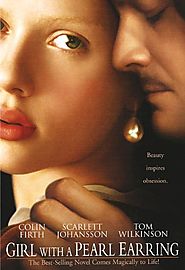
A daring, intimate fictionalization of the circumstances surrounding the inspiration behind the famous painting by 17th-century Dutch artist Johannes Vermeer.
"Girl With a Pearl Earring" is a quiet movie, shaken from time to time by ripples of emotional turbulence far beneath the surface. It is about things not said, opportunities not taken, potentials not realized, lips unkissed. Do not believe those who think this movie is about the "mystery" of the model, or Vermeer's sources of inspiration, or medieval gender roles, or whether the mother-in-law was the man in the family. "Girl With a Pearl Earring" is about how they share a professional understanding that neither one has in any way with anyone else alive. - Roger Ebert
Set in approximately 1665.
Starring Scarlett Johansson, Colin Firth, Tom Wilkinson, Judy Parfitt, Cillian Murphy.
Note: ''Girl With a Pearl Earring'' is rated PG-13 for shadowy sexual innuendo and suggestive situations.
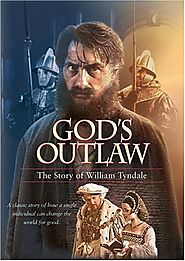
A true story, God's Outlaw is about international politics, church intrigue, cold-blooded betrayal, and false justice ending in a criminal's death. But it's also about victorious faith and spiritual triumph over some of the greatest political and religious forces known in the 16th century.
A simple God-seeking man, William Tyndale somehow became one of the most wanted men in England and all of Europe. Pursued by King Henry VIII, Lord Chancellor Sir Thomas More, and the Pope's personal legate Cardinal Wolsey, he darted across Europe to avoid capture--always pushing to complete the task that obsessed him.
The task was translating the Bible into English and publishing it for his fellow countrymen--Englishmen who lived in a country where the Bible and even prayers in English were outlawed by a harsh and rigid religious establihsment. Today he is renowned as "the father of the English Bible," and is recognized as one of the major leaders of the English Reformation. But the tale of how he lived and died as "God's outlaw" is a compelling "rest-of-the-story," and is especially a moving encouragement for modern people of faith.
Starring Bernard Archard, Keith Barron, Terence Hardiman, Roger Rees, Willoughby Goddard.
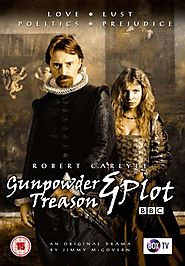
Mini series depicting the turbulent and bloody reigns of Scottish monarchs Mary, Queen of Scots and her son King James VI of Scotland who became King James I of England and foiled the Gunpowder Plot.
There's plenty of blood-and-guts in writer Jimmy McGovern's beautiful and brutal telling of the turbulent reigns of mother-and-son Scottish monarchs Mary, Queen of Scots and King James VI of Scotland, who would go on to become King James I of England. And there is plotting aplenty as the pair struggle to take control of England, shrewdly manipulating the sectarian divide between Catholics and Protestants. - Variety
Starring Vulpe Adrian, Carmen Ungureanu, Clémence Poésy, Tadeusz Pasternak, Maria Popistasu.
Note: The link here is for Region 2. Not for the sensitive: the "BBC is a master at staging costume dramas, but it is unlikely so much blood has been spilled in the good name of historical drama." - Variety
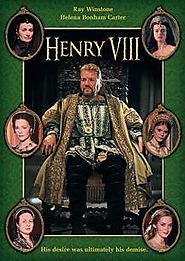
Henry VIII's 38-year reign as monarch of England saw that country transformed from a sleepy backwater of jousting tournaments and Catholic piety to a nation torn by religious and political strife -- all because of the king's desperation for a male heir.
From the moment Henry Tudor casts aside his faithful wife Katherine of Aragon for the bewitching and determined Anne Boleyn, he sets himself on a course of disastrous marriages. The pious yet tragic Jane Seymour, bitter outcast Anne of Cleves, the adulterous child bride Katherine Howard and the devoted Katherine Parr all followed. The lucky ones were ruthlessly cast aside. The not-so-lucky ones were sent to their deaths. Ray Winstone (Cold Mountain, King Arthur) stars as the cruel and colorful monarch who married six times, founded a new church and presided over a bloodbath. Helena Bonham Carter stars as the seductress Anne Boleyn; the stellar cast also includes David Suchet as Cardinal Wolsey, Emilia Fox as Jane Seymour, Sean Bean as revolutionary Robert Aske, Charles Dance as the Duke of Buckingham, Mark Strong as the Duke of Norfolk and Michael Maloney as Archbishop Thomas Cranmer. The series chronicles the life of Henry VIII of England from the disintegration of his first marriage to an aging Spanish princess until his death following a stroke in 1547.
The tragic history of Henry VIII gets a brash, full-blooded treatment in this well-cast, two-part production for British TV. Having made a vicious impression in the acclaimed 2000 gangster film Sexy Beast, Ray Winstone plays Henry as a self-doubting, insecure brute with base instincts and a healthy suspicion toward his not-so-loyal subjects. Director Pete Travis and writer Peter Morgan can be forgiven for neglecting the greater scope of history; by leaving epic battles off-screen and focusing on the intrigues and betrayals surrounding Henry's infamous succession of six ill-fated wives, this authentic-looking melodrama succeeds as a tightly paced study of hidden agendas among the King's immediate staff. In a story that involves religious upheaval, infidelity, courtly corruption, and Henry's anguished obsession to sire a male heir to the throne, Helena Bonham Carter (as Anne Boleyn) is an obvious stand-out in an excellent cast that includes Charles Dance, David Suchet, and Sean Bean, while Winstone's volatile Cockney bearishness drew mild objections from royal-drama purists. The film doesn't flinch from the brutality of the early 1500s when Henry reigned with an iron fist (including several beheadings to drive the point home), so this Henry VIII is not for kids or the faint of heart. Taken on its own terms, however, it's a rich, irresistible example of superior British filmmaking. --Jeff Shannon
Produced principally by Granada Television for ITV.
Shown on PBS Masterpiece Theatre.
Starring Ray Winstone, Joss Ackland, Sid Mitchell, Charles Dance, Mark Strong.
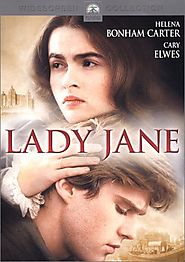
The death of King Henry VIII throws his kingdom into chaos because of succession disputes. His weak son Edward, is on his deathbed. Anxious to keep England true to the Reformation, a scheming minister John Dudley marries off his son, Guildford to Lady Jane Grey, whom he places on the throne after Edward dies. At first hostile to each other, Guildford and Jane fall in love. But they cannot withstand the course of power which will lead to their ultimate downfall.
"I foresee a glittering future for your daughter," the conspiratorial Duke of Northumberland insidiously whispers to the mother of Lady Jane Grey, the woman who would be England's queen, albeit for only nine days. The same could be said for Helena Bonham Carter, who, in her screen debut, carries this historical drama with aplomb. Jane, a principled and precocious 15-year-old (she reads Plato in Greek) was a pawn in a plot to maintain Protestant rule in the wake of young King Edward's death. A dashing Cary Elwes, anticipating his swashbuckling role in The Princess Bride, costars as Northumberland's feckless, wastrel son, Guilford, whose arranged marriage to Jane unexpectedly blossoms into love and rebellion. Anglophiles will bask in this impeccably mounted production (featuring Patrick Stewart as Jane's bullying father), but swooning teens, too, may embrace these young lovers as did the youths who made Franco Zeffirelli's 1968 Romeo & Juliet a box-office smash in its day. --Donald Liebenson
Starring Helena Bonham Carter, Cary Elwes, John Wood, Michael Hordern, Jill Bennett.
Note: ''Lady Jane'' is rated PG-13. It contains some nudity and several bedchamber scenes.
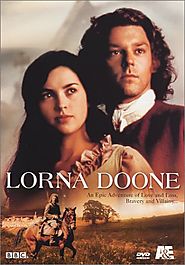
Lorna Doone is a passionate love story set in 17th century rural England, charting the young John Ridd's search for revenge after his father's murder, and the chance encounter with beautiful Lorna Doone that changes the course of his life.
Star-crossed lovers, feuding family, royal plots, noble destinies, and salt-of-the-earth heroes. No wonder R.D. Blackmore's romantic classic has been a perennial favorite. Amelia Warner (Michael Caine's innocent child bride in Quills) is Lorna, the beautiful young brunette "queen" of the feral Doone clan in this latest adaptation, a handsome 2.5-hour co-production between the BBC and A&E. The once noble line now lives out of a swamp fortress and preys off the local farmers and tradesmen, but the family patriarch (Peter Vaughan) has hatched a plot to win back his title and his land. Handsome John Ridd (Richard Coyle) swears vengeance against the Doones when they murder his father, but he falls for Lorna, and the rakish, ruthless Doone scion (Aiden Gillen, who swaggers through the drama with a perpetual sneer) refuses to give up his claim on the girl without a fight.
This is the kind of British romantic adventure that decries the tradition of nobility and privilege while rewarding its heroes with those very privileges, all within a grand framework of melodramatic twists, thrilling battles, and chivalrous heroics. Director Mike Barker creates an appropriately larger-than-life world at once pastoral and savage for his little epic--shot in the verdant British countryside, where a lush forest green permeates every outdoor scene, while the dusky interiors glow with candlelight--giving in completely to the sweeping emotional melodrama at the core of the story. --Sean Axmaker
Starring Neil Finnighan, Jack Baverstock, Trevor Cooper, Aidan Gillen, Ruth Sheen.
Note: Lorna Doone was published in 1869 and takes place in Devon and Somerset, particularly around the East Lyn Valley area of Exmoor, but the television drama was filmed more than 150 miles north on the Brecon Beacons, in Wales.
The narrator, John Ridd, says he was born on 29 November 1661; in Chapter 24, he mentions Queen Anne as the current monarch, so the time of narration is 1702–1714 making him 40–52 years old. He recounts details of the story as early as 1673 and as late as 1686. Blackmore incorporated real events and places into the novel.
According to the preface, the work is a romance and not a historical novel, because the author neither "dares, nor desires, to claim for it the dignity or cumber it with the difficulty of an historical novel." As such, it combines elements of traditional romance, of Sir Walter Scott's historical novel tradition, of the pastoral tradition, of traditional Victorian values, and of the contemporary sensation novel trend. The basis for Blackmore's historical understanding is Macaulay's History of England and its analysis of the Monmouth rebellion. Along with the historical aspects are folk traditions, such as the many legends based around both the Doones and Tom Faggus.
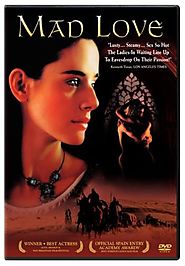
Spain's answer to Elizabeth is a 16th-century political conspiracy drama inspired by the true story of the "mad" Queen Joan and transformed by septuagenarian Vicente Aranda (Lovers, Jealousy) into an earthy bodice ripper. Age certainly hasn't dulled his taste for hot-blooded cinema. Spanish beauty Pilar López de Ayala, with her doe eyes and milky complexion, is the royal innocent sacrificed in a political marriage to the swarthy Prince Philip (Daniele Liotti with a Fabio mane of hair), a womanizing cad whose wandering eye transforms the naive virgin into a tempestuously jealous wife. Aranda matches Pedro Almodóvar in the arena of self-destructive love, obsessive passion, sweaty cinematic sex, and deliriously melodramatic spectacle. If this portrait of Joan as a volatile package of emotional nitroglycerin borders on melodramatic cliché, López de Ayala gives her a fiery, full-blooded passion and Aranda mounts her romantic obsession in an unhinged, undeniably lusty costume drama. --Sean Axmaker
Based on historical accounts, director Vincent Aranda has created a lavish, sumptuous film set in 16th century Flandes, Spain. Princess Juana de Castilla (Pilar Lopez de Ayala) as come to fulfill her aristocratic obligation in an arranged marriage with Archduke Felipe of Austria (Daniele Liotti).
What begins as a great romance quickly degenerates into a very sad and depressing tale of infidelity on the part of Felipe and obsessive compulsive paranoia displayed by the frantic Juana. Juana's obsession with her husbands affairs escalate behaviors that are soon the main subject of gossip for the aristocracy and the labeling of the desperate Juana as "Joan the Mad." When Juana's Mother and older brothers' die unexpectedly she now becomes heir to the throne of Spain. Will she reign as Queen, or will Felipe succeed in having her proclaimed mad by the Spanish court and put away? Fine performances all around by this all Spanish cast, especially by the two main characters; Pilar Lopez de Ayala and Daniele Liotti. Also in a small but memorable role is the seductive beauty Manuela Arcuri as the Moorish princess Aixa-Beatriz. - Brian E. Erland
In Spanish with English subtitles.
Starring Pilar Lopez de Ayala, Daniele Liotti, Giuliano Gemma.
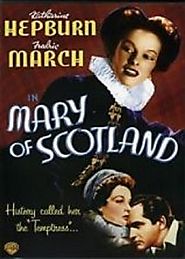
The recently widowed Mary Stuart returns to Scotland to reclaim her throne but is opposed by her half-brother and her own Scottish lords.
Mary Stuart (Katharine Hepburn), the Queen of Scotland, returns to her native highlands upon the death of her husband, the King of France -- which is one of the rival nations of English queen Elizabeth Tudor (Florence Eldridge). After Mary's third marriage to the Earl of Bothwell (Fredric March), the Scottish people become divided, and Mary is forced to abdicate her throne. She seeks help from Queen Elizabeth, who fears Mary's influence and has her imprisoned, and later executed.
A richly produced, dignified and stirringly dramatic cinematization of one of the most colorful periods and personalities in history, RKO-Radio's "Mary of Scotland" must be considered one of the year's notable photoplays. Built upon the framework of Maxwell Anderson's play and re-enforced, as the need arose, from documentary and imaginative sources, the picture has depth, vigor and warm humanity. - NYT
Starring Katharine Hepburn, Fredric March, Florence Eldridge.
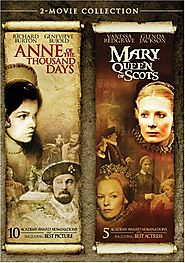
Mary Stuart, who was named Queen of Scotland when she was only six days old, is the last Roman Catholic ruler of Scotland. She is imprisoned at he age of 23 by her cousin Elizabeth Tudor, the English Queen and her arch adversary. Nineteen years later the life of Mary is to be ended on the scaffold and with her execution the last threat to Elizabeth's throne has been removed. The two Queens with their contrasting personalities make a dramatic counterpoint to history. - Written by alfiehitchie
It cherishes a soap-opera approach to history, condensing several decades of pretty complicated diplomacy into an account of Mary’s three marriages, her second husband’s bisexuality, Elizabeth’s quirky affair with her Master of Horses, and so on. Vanessa Redgrave is a tall, straight-backed, finely spirited Mary, and Glenda Jackson makes a perfectly shrewish, wise Elizabeth.- Roger Ebert
Starring Vanessa Redgrave, Glenda Jackson, Patrick McGoohan.
Note: Many found this film to be too long and too much of a soap opera, but as period dramas focusing on Mary, Queen of Scots are limited, this may of interest. Mary, Queen of Scots was the heir to James V of Scotland, crowned before her first birthday in 1542. She also claimed the English throne and became involved in a power struggle with Elizabeth I.
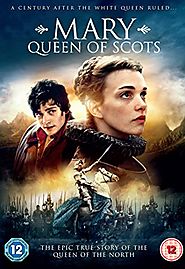
A queen who lost three kingdoms. A wife who lost three husbands. A woman who lost her head.
Mary Queen of Scots spends her childhood in France and is meant to become also Queen of France. However, her ailing husband dies and the young widow returns alone to Scotland, a country devastated by war. Elizabeth has just become Queen of England, for Mary she is like a twin sister to whom she can open her heart. Mary weds again and gives birth to an heir to the thrown. Her second husband, Lord Darnley, proves to be a weakling. When Mary finds the love of her life, the Earl of Bothwell, she has Darnley murdered and marries Bothwell. Horrified by this deed and the blind passion that motivated it, both the nobles and the people of Scotland spurn her. To avert a bloody battle, Mary is compelled to give up her beloved Bothwell. In desperate straits, she turns to Elizabeth for help. In response, the Queen of England imprisons her. After 19 years spent in a golden cage, Mary finds release at last: Elizabeth sends her to the block.
A sympathetic psychological portrait set to be an art-house hit. - The Guardian
Starring Camille Rutherford, Mehdi Dehbi, Sean Biggerstaff.
In English and French with English subtitles.
Note: The link is for Region 2. The film is based on Austrian novelist Stefan Zweig's 1935 biography, Mary Stuart, a long-term bestseller in Germany and France but out of print in the UK and the US for decades until 2010.
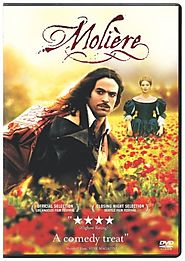
In 1645, the French playwright and actor Jean-Baptiste Poquelin -- better known as Molière -- mysteriously disappeared for several weeks, and this lavish comedy drama imagines a scenario that could explain what may have happened to him. At this time, Molière (Romain Duris) is touring the French countryside with his traveling theater company, and he's yet to be recognized as one of the continent's great authors (or achieve significant financial success). Molière is put in jail after skipping out on some unpaid debts, but is freed after his fine is paid by two strangers. Molière discovers his benefactors are acting on behalf of Jourdain (Fabrice Luchini), a very wealthy man who has a beautiful wife, Elmire (Laura Morante) and two lovely daughters. However, Jourdain has fallen head over heels for Celimene (Ludivine Sagnier), a gorgeous widow, and he's written a short play in order to demonstrate his feelings for her. Jourdain needs someone to help him polish his script and serve as an acting coach, and he's recruited Molière for the job. Needing the money, Moliere accepts, but he poses as a man of the cloth, Monsieur Tartuffe, to keep his identity a secret. Molière soon realizes that Jourdain's talent exists only in the rich man's imagination, and that Jourdain already has a rival for Celimene's affections, the charming but duplicitous Dorante (Edouard Baer). Molière was written and directed by Laurent Tirard. ~ Mark Deming, Rovi
Bubbling with wit, stellar performances and lavish cinematography, MOLIÈRE stars multi-Cesar-nominated French actor Romain Duris as Molière, a down-and-out actor-cum-playwright up to his ears in debt. When the wealthy Jourdain (Cesar(r)-winner Fabrice Luchini) offers to cover that debt (so that Molière's theatrical talents might help Jourdain win the heart of a certain widowed marquise), hilarity ensues. Disguised as a priest, Molière becomes a guest in Jourdain's palace on the pretext of teaching Jourdain the craft of the stage, which annoys his wife, Elmire. But, soon after, the confrontation between Elmire and Molière turns seductive. Too busy to notice, Jourdain enlists the aid of a well connected and scheming acquaintance, to help him pursue the young widow. Romantic yearning, human foibles and laughs galore all characterize MOLIÈRE, a delightful film that slyly captures your heart.
Starring Fabrice Luchini, Laura Morante, Romain Duris, Edouard Baer, Ludivine Sagnier.
Note: The audience reviews were better than the critics' but both agreed that the production was sumptuous. It's a comedy as much as it is a romance.
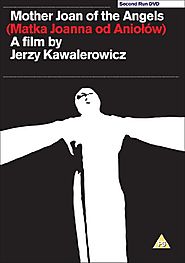
A priest is sent to a small parish in the Polish countryside which is believed to be under demonic possession and there he finds his own temptations awaiting. Set in the 17th century.
One of the landmarks of Polish cinema, this celebrated film has now been fully and carefully restored from original materials and is presented here in this beautiful new High-Definition transfer. Based on the documented story of the demonic possession of a group of nuns that led to the burning of a priest at the stake in Loudun, France in 1634 (which also formed the basis for Ken Russell's notorious 1971 film The Devils (Oliver Reed, Vanessa Redgrave) and provided inspiration to Aldous Huxley for his renowned novel The Devils of Loudun). In acclaimed director Jerzy Kawalerowicz's hands Mother Joan of the Angels is a spare, visually astonishing and profoundly disturbing exploration of faith, repression, fanaticism and sexuality. Aided by an extraordinary performance by Lucyna Winnicka as Mother Joan, Kawalerowicz produces one of cinema's most evocative and intense studies of the tragedy of emotion repressed by dogma.
In Polish with English subtitles.
Starring Lucyna Winnicka, Mieczyslaw Voit, Anna Ciepielewska.
Note: Not suitable for children.
SaveSave
SaveSave
